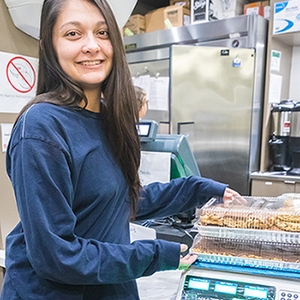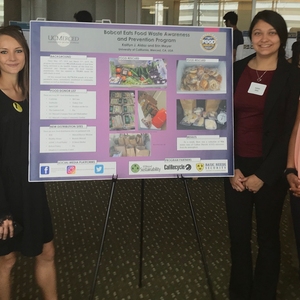Fill Plates, Not Landfills: Implementing the Bobcat Eats Food Waste Awareness and Prevention Program
University of California, Merced
Project Overview
The Bobcat Eats Food Waste Awareness and Prevention Program is a collaboration between the University of California, Merced (UC Merced) and the Merced County Food Bank to reduce food waste (and its associated greenhouse gas emissions) and food insecurity at the food bank and in Merced County. The program has many components including: 1.) setting up new food distribution sites in the area, 2.) creating a system and network to move perishable foods through the food bank more effectively, 3.) promoting and supporting the gleaning program, 4.) rescuing food from local stores, cafes and farmers’ markets. Since launching the program in May 2018, 954,784 total pounds of food was diverted from the landfill which is enough for 795,653 meals. Saving this food leads to the reduction of 981 metric tons of CO2 emissions from the atmosphere. Additionally, 21 new distribution sites have been established, 24 new food donors have been identified and three new jobs have been created.
Background
During the summer of 2017, employees from the Merced County Food Bank were speaking with staff members from the University of California, Merced’s Department of Sustainability about food waste generally and also at the food bank specifically where they were wasting 15% of their food because they could not distribute the perishable items fast enough due to the limited number of food pantries and churches in the area. This is especially problematic in Merced County where 16.7% of adults are food insecure and where 61% of UC Merced undergraduates are food insecure. In response, the Department of Sustainability, as well as other UC Merced departments such as Community Engagement, CropMobster Merced, UC Merced Dining Services and Basic Needs Security, partnered with the Merced County Food Bank to develop a food waste reduction program and to write for a CalRecycle grant addressing food waste. CalRecycle awarded the grant in March 2018 and gave notice to proceed in May 2018. A program coordinator was hired who helped develop and implement the program. The program has grown beyond fighting food waste at the food bank and now also rescues food from cafes, grocery stores and farmers’ markets. Two UC students have been hired on and several groups of volunteers have devoted time to the program, allowing the program to scale further.
Goals
The overall goal of the program is to redirect 108 tons of food from the landfill every quarter and distribute it to our most vulnerable community members and families. We have continuously surpassed our quarterly goals by: 1.) setting up new distribution sites to connect them with surplus food, 2.) rescuing food from cafes, stores and other locations, 3.) implementing new policies and procedures at the food bank where distribution sites are called whenever surplus food needs to be moved quickly.
This goal allows us to reduce food waste and food insecurity whilst also mitigating climate change and promoting food justice and social equity.
Implementation
Upon receiving the notice to proceed, key stakeholders, including the Merced County Food Bank, the Department of Sustainability, Community Engagement, CropMobster Merced, UC Merced Dining Services and Basic Needs Security, met to discuss next steps and to start program development. The initial program components were identified as 1.) identifying and setting up new food distribution sites, 2.) developing a system and network of partners to help move perishable foods through the food bank more effectively, 3.) helping to promote and support the gleaning program. A coordinator was hired on and began work on each component. The coordinator reached out to community organizations, churches and others to serve as distribution sites. Community presentations helped to develop out these partnerships as well. As the program developed, social media marketing, news articles and a feature on the local news also aided in establishing new distribution sites. A system was developed to get food out of the food bank faster simply by having food bank staff call the program coordinator whenever there is a surplus of food. The coordinator then contacts new distribution sites as well as local agencies and food pantries to alert them of the surplus and to ask them to pick up free food. Lastly, the coordinator, student staff, food bank employees and other partners all work together to help promote the food bank’s gleaning program, Picking for Purpose.
As the program grew, a community partner reached out to the coordinator connecting them to a local café, who unfortunately was wasting food and wanted help rescuing that food. The program started rescuing food from the café on a weekly basis and has since identified other opportunities for food rescues in the area. The program now rescues food from two large local grocery stores, two farmers’ markets, a variety of cafes, some restaurants and a local elementary school.
The program also partnered with UC Merced’s Carson House Living Learning Community. This community of UC students have an interest in sustainability and undertake a semester long project to get more involved in the community and to learn about sustainability issues and solutions. Two projects were created for two groups of students. One team helped conduct food rescues at an on-campus farmers’ market where they rescued food weekly and brought it to UC Merced’s food pantry, Bobcat Pantry. The students also collected data and concluded with a community presentation. The second team worked with a community partner from a local church to rescue food each Friday from UC Merced’s Lantern Café. They too collected data and gave a final presentation allowing them to develop personally and professionally.
In an effort to scale the program and thus save even more food and feed more people, the coordinator and student staff continue to do outreach to partner with new distribution sites, to find new food donors and to promote the gleaning program.
Timeline
October 2017- UC Merced’s Department of Sustainability and the Merced County Food Bank submitted an RFP to CalRecycle for a food waste reduction grant. March 2018- UC Merced and the Merced County Food Bank were awarded grant funding to implement the Bobcat Eats Food Waste Awareness and Prevention Program. May 2018- The Notice to Proceed was received from CalRecycle. A coordinator was hired on and program development and implementation began. September 2018- One student staff were hired on allowing for program growth and expansion. January 2019- A second student staff was hired on. March -April 2019- The marketing campaign ramped up with the release of two news articles and one ABC 30 feature which led to an outpouring of volunteers, donors and organizations that were interested in serving as distribution sites. May 2019- One year after launching, we have rescued more than 955,000 pounds of food.
Financing
CalRecycle awarded a grant in the amount of $100,000. $9,000 of this is allotted for administrative costs and licenses/permitting and trainings. The budget allows $35,000 for equipment such as new refrigerators, food rescue equipment and other necessary items. $6,000 will go towards maintenance (i.e. equipment maintenance). The budget provides $47,000 for personnel and $3,000 for marketing/education.
Results
Between May 14th, 2018 and April 30th, 2019, 954,784 total pounds of food was diverted from the landfill and redirected to those in need which is enough for 795,653 meals. Specifically, 939,805 pounds was diverted from the landfill at the MCFB, 4,170 pounds was diverted at UC Merced and 10,808 pounds was diverted in the community from locations such as Jantz Café, Starbucks and other food donors. The diversion of 954,784 resulted in the reduction of 981 metric tons of CO2 emissions from the atmosphere. We have set up 21 new food distribution sites and formed partnerships with 24 food donors.
The qualitative impacts and results are best described by our partners themselves:
“We here at Merced College have been receiving the leftovers from Starbucks and Bagel Tyme! It has been wonderful for our students! Every week we receive anywhere from 20-40 lbs of bagels. They don't go to waste on our campus! Our students now know that on Thursdays they can get FREE pastries and bagels! This helps our hungry students and helps end food waste!” “The program has helped the community we serve immensely. Bobcat Eats Waste Awareness and Prevention Program has aided us in giving food to those in need that would have otherwise gone to waste.”
“We have been very grateful to the be the recipient of surplus food. We serve approximately 85 seniors in our assisted living locations. The food that we receive helps off set our food costs so that we can use those resources to help seniors in other ways. In addition to our assisted living locations, we have a home care division, in total we employ 110 people which are mostly entry level, minimum wage earners. Any food we receive is also distributed to employees and the gratitude that they express says it all.”
Lessons Learned
Food security, food waste and climate change are wicked problems and strong partnerships and collaborations with diverse groups of many passionate people and dedicated organizations are vital for program success. Along with the partners who developed and helped implement the program, we also partner and collaborate with farmers, community gardens, grocery stores, cafes, restaurants, WIC, local food pantries, local nonprofits, the City of Merced and many more. We all work together to save food from going to waste and to feed those in need.
Our program has been highly successful with the help of the donors and volunteers and people really do want to help better our community. Donors want to donate food. Volunteers want to help rescue food. It is important to show them gratitude and to give them valuable and rewarding experiences. We send thank you notes to donors and volunteers. We also aim to create rewarding and impactful volunteer experiences.
The media and social media have aided in program success. Two news articles and a feature on our local ABC30 station led to and many new volunteers, distribution sites and food donors.


